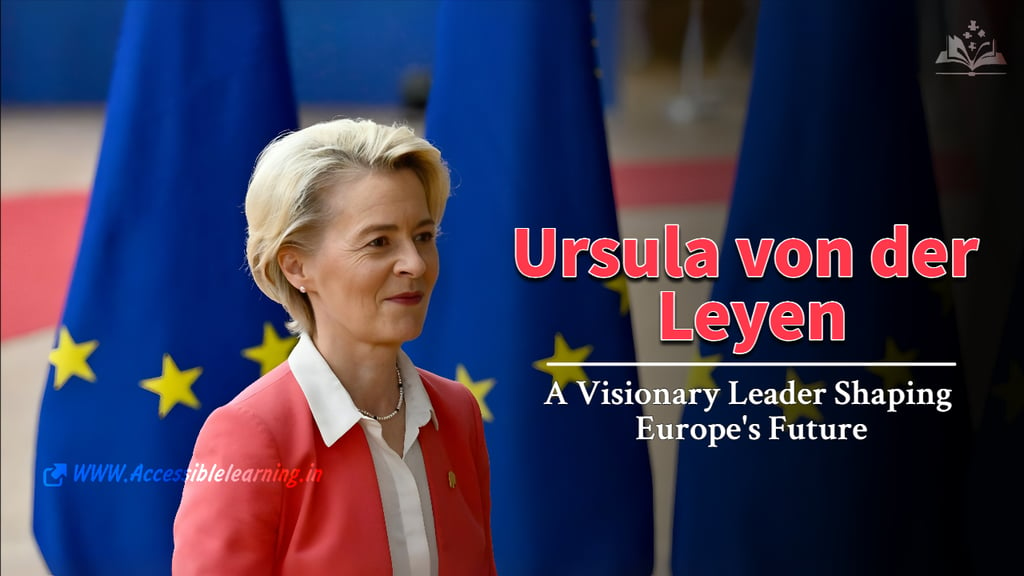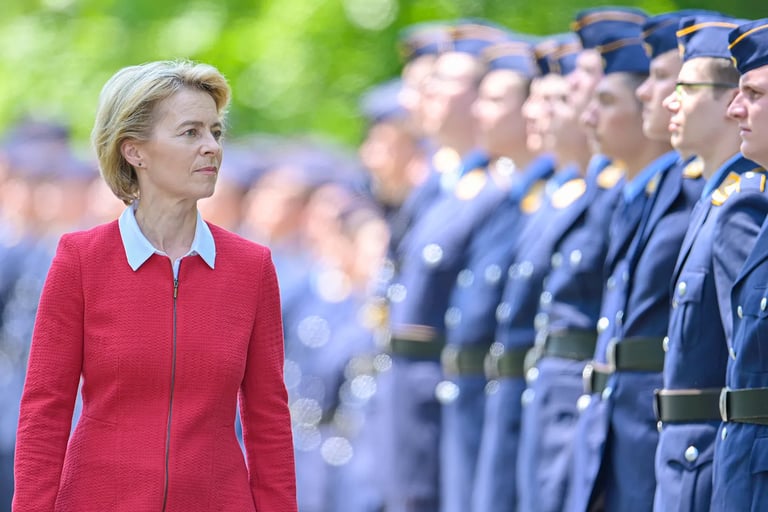
Ursula von der Leyen: A Visionary Leader Shaping Europe's Future
Discover the inspiring journey of Ursula von der Leyen, the first female President of the European Commission. Explore her early life, political career, key achievements, challenges, and future prospects in global leadership
BIOGRAPHYTHE GREAT LEADERPOLITICAL JOURNEYEUROPEAN UNIONEDUCATION/KNOWLEDGE
Kim Shin
2/22/20255 min read


Ursula von der Leyen has emerged as one of the most influential leaders in European politics, serving as the first female president of the European Commission. With a career spanning medicine, defense, and governance, her leadership has been instrumental in shaping EU policies on climate change, digital transformation, and geopolitical stability. This article delves into her journey, achievements, and the challenges she has faced in her tenure.
Early Life and Education
Born on October 8, 1958, in Ixelles, Belgium, Ursula Gertrud von der Leyen was raised in a politically active family. Her father, Ernst Albrecht, was a prominent German politician who served as the Minister-President of Lower Saxony. Her upbringing in an environment of policy and governance laid the foundation for her future in politics.
Von der Leyen pursued medicine at the Hannover Medical School, where she earned her doctorate in 1991. Her academic career also included studying at the London School of Economics, an experience that broadened her perspective on international affairs.
Political Career (Entry into Politics)
Von der Leyen entered politics in the early 2000s as a member of the Christian Democratic Union (CDU), Germany’s center-right political party. She quickly climbed the ranks, securing her first ministerial position in 2005 under Chancellor Angela Merkel.
Ministerial Roles in Germany
Minister for Family Affairs, Senior Citizens, Women, and Youth (2005-2009): Advocated for parental leave reforms and gender equality in the workplace.
Minister of Labour and Social Affairs (2009-2013): Focused on employment policies and labor market stability.
Minister of Defence (2013-2019): Became Germany’s first female defense minister, where she pushed for military modernization and stronger European defense cooperation.


President of the European Commission
In July 2019, Ursula von der Leyen made history by becoming the first woman to lead the European Commission, the executive branch of the European Union (EU). Her appointment came at a time of significant global challenges, including Brexit, climate change, and rising geopolitical tensions.
Key Policies and Achievements
The European Green Deal
One of von der Leyen’s most ambitious projects, the European Green Deal, aims to make the EU carbon-neutral by 2050. This initiative includes massive investments in renewable energy, sustainable industries, and emission reductions.
COVID-19 Response and Recovery
During the COVID-19 pandemic, she played a pivotal role in coordinating Europe’s response, securing vaccine supplies for member states, and launching the NextGenerationEU recovery fund worth €750 billion to rebuild economies post-pandemic.
Digital Transformation and AI Regulation
Recognizing the power of artificial intelligence and digital innovation, von der Leyen has been a strong advocate for Europe’s Digital Strategy, pushing for AI regulations, cybersecurity measures, and the expansion of 5G technology.
Geopolitical Leadership
Under her leadership, the EU has taken a more assertive role in global politics, standing firm on issues like the Russia-Ukraine war, human rights, and trade relations with China and the U.S.
Strengthening EU Defense and Security
Von der Leyen has been vocal about the need for a stronger European defense strategy. She has pushed for greater military cooperation among EU member states and supported initiatives to increase defense spending to bolster Europe’s security amid rising global conflicts.
Economic and Social Reforms
She has focused on promoting economic stability, employment, and social equity in the EU. Her policies have included enhancing workers' rights, addressing income inequality, and ensuring businesses transition smoothly into a more sustainable and digitized economy.
Challenges and Criticism
Military spending mismanagement: During her time as Germany’s Defense Minister, critics accused her of poor oversight in military procurement.
Vaccine rollout delays: The EU’s initial COVID-19 vaccine distribution faced delays, leading to criticism of the Commission’s handling of contracts and supplies.
Tensions with Member States: Disagreements with Hungary and Poland over rule-of-law issues have led to political friction.
Energy Crisis Management: Following the Russian invasion of Ukraine, the EU faced an energy crisis. Von der Leyen’s approach to energy diversification and price regulations received mixed responses, with some praising her efforts and others criticizing the speed and execution of reforms.


FAQ's
Who is Ursula von der Leyen?
Ursula von der Leyen is a German politician serving as the President of the European Commission since December 1, 2019. She is the first woman to hold this position and has played a key role in shaping EU policies on climate change, digital transformation, and global diplomacy.
What is Ursula von der Leyen known for?
She is known for her leadership in the European Green Deal, COVID-19 response, digital transformation, and strengthening EU defense policies. She was also Germany’s first female Minister of Defence before becoming the EU Commission President.
What are Ursula von der Leyen’s major achievements as the EU Commission President?
Launching the European Green Deal to make the EU carbon-neutral by 2050.
Managing the EU’s COVID-19 response, securing vaccines, and introducing the €750 billion NextGenerationEU recovery fund.
Strengthening digital and AI regulations in the European Union.
Supporting Ukraine during the Russia-Ukraine war with financial and military aid.
What challenges has Ursula von der Leyen faced in her career?
She has faced criticism over delays in vaccine rollout during COVID-19, military procurement issues during her tenure as Germany’s Defence Minister, and political tensions with EU member states like Hungary and Poland over rule-of-law concerns.
What is Ursula von der Leyen’s background before politics?
Before entering politics, she studied medicine and worked as a physician. She holds a doctorate in medicine and also studied at the London School of Economics, which influenced her views on international affairs.
What is Ursula von der Leyen’s stance on global conflicts?
She has taken a strong stance on global diplomacy, particularly in supporting Ukraine against Russian aggression, advocating for human rights, and reinforcing the EU’s strategic defense initiatives.
What is next for Ursula von der Leyen after 2024?
Her current term as EU Commission President ends in 2024, and there is speculation about her running for a second term. Some also suggest she could take on a leadership role in global organizations like the United Nations or World Bank.
Future Prospects
As her term approaches its conclusion in 2024, speculation grows regarding her political future. Some anticipate her re-election, while others believe she may take on a new international leadership role. Given her track record, von der Leyen’s influence in global politics is expected to persist. She has also been mentioned as a potential candidate for leadership roles in global organizations such as the United Nations or the World Bank.
Ursula von der Leyen has left an indelible mark on European politics, demonstrating resilience, vision, and adaptability. From healthcare to defense and now the EU presidency, her leadership continues to shape the continent’s future. Whether in diplomacy, digital transformation, climate policies, or defense, von der Leyen remains a key figure in shaping Europe’s trajectory on the global stage.
Subscribe To Our Newsletter
All © Copyright reserved by Accessible-Learning Hub
| Terms & Conditions
Knowledge is power. Learn with Us. 📚


